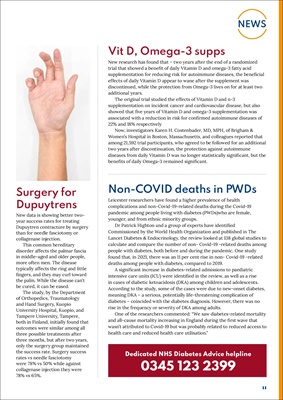
11
NEWS
Surgery for
Dupuytrens
New data is showing better twoyear
success rates for treating
Dupuytren contracture by surgery
than for needle fasciotomy or
collagenase injection.
This common hereditary
disorder affects the palmar fascia
in middle-aged and older people,
more often men. The disease
typically affects the ring and little
fingers, and they may curl toward
the palm. While the disease can't
be cured, it can be eased.
The study, by the Department
of Orthopedics, Traumatology
and Hand Surgery, Kuopio
University Hospital, Kuopio, and
Tampere University, Tampere,
both in Finland, initially found that
outcomes were similar among all
three possible treatments after
three months, but after two years,
only the surgery group maintained
the success rate. Surgery success
rates vs needle fasciotomy
were 78% vs 50% while against
collagenase injection they were
78% vs 65%.
Vit D, Omega-3 supps
New research has found that - two years after the end of a randomized
trial that showed a benefit of daily Vitamin D and omega-3 fatty acid
supplementation for reducing risk for autoimmune diseases, the beneficial
effects of daily Vitamin D appear to wane after the supplement was
discontinued, while the protection from Omega-3 lives on for at least two
additional years.
The original trial studied the effects of Vitamin D and n-3
supplementation on incident cancer and cardiovascular disease, but also
showed that five years of Vitamin D and omega-3 supplementation was
associated with a reduction in risk for confirmed autoimmune diseases of
22% and 18% respectively
Now, investigators Karen H. Costenbader, MD, MPH, of Brigham &
Women's Hospital in Boston, Massachusetts, and colleagues reported that
among 21,592 trial participants, who agreed to be followed for an additional
two years after discontinuation, the protection against autoimmune
diseases from daily Vitamin D was no longer statistically significant, but the
benefits of daily Omega-3 remained significant.
Non-COVID deaths in PWDs
Leicester researchers have found a higher prevalence of health
complications and non-Covid-19-related deaths during the Covid-19
pandemic among people living with diabetes (PWDs)who are female,
younger, and from ethnic minority groups.
Dr Patrick Highton and a group of experts have identified
Commissioned by the World Health Organization and published in The
Lancet Diabetes & Endocrinology, the review looked at 138 global studies to
calculate and compare the number of non- Covid-19 -related deaths among
people with diabetes, both before and during the pandemic. One study
found that, in 2021, there was an 11 per cent rise in non- Covid-19 -related
deaths among people with diabetes, compared to 2019.
A significant increase in diabetes-related admissions to paediatric
intensive care units (ICU) were identified in the review, as well as a rise
in cases of diabetic ketoacidosis (DKA) among children and adolescents.
According to the study, some of the cases were due to new-onset diabetes,
meaning DKA - a serious, potentially life-threatening complication of
diabetes - coincided with the diabetes diagnosis. However, there was no
rise in the frequency or severity of DKA among adults.
One of the researchers commented: "We saw diabetes-related mortality
and all-cause mortality increasing in England during the first wave that
wasn't attributed to Covid-19 but was probably related to reduced access to
health care and reduced health care utilisation."
Dedicated NHS Diabetes Advice helpline
0345 123 2399